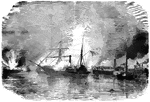Clipart tagged: ‘boat on fire’

Harriet Lane
"Daring and desperate attack- surprise and capture of the United States gunboat Harriet Lane…

Destruction of Nashville
"Destruction of the famous Confederate privateer Nashville, in the Ogeechee River, Ga., by…